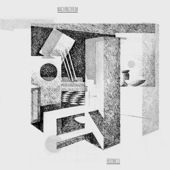
Machinedrum
Room(s)
(Planet Mu; 2011)
By Matt Main | 20 September 2011
Having experimented (usually successfully) with some much more testing aspects of digital sound, including ventures into and beyond the fields of IDM, glitch, and even hip-hop, it is perhaps not entirely surprising that Travis Stewart has shifted direction once more. What is immediately striking, however, is that this new progression is not more intricate or arduous in its approach, nor does it return to the disappointing Want to 1 2? (2009), which overflowed with intrusive embellishments and generally crowded out any really resonant statement; no, with Room(s), Machinedrum has boiled his product down to only the necessary ingredients, and has in essence crafted a layered pop record.
Thus, the most apparent contemporary of Machinedrum in this respect is not the trendy dubstep/electronics of FaltyDL or Africa Hitech, as one might reasonably predict, but Nicolas Jaar and his 2011 debut Space is Only Noise. Jaar’s use of “meditative space,” as CMG’s Andrew Hall described it, “...barely qualifies as dance music,” though this did not prevent many critics overlooking the simple, electro-pop core of the songs and placing him in misleading categories like “deep house.” The pop sensibilities in both cases so plaintively appeal for the listener’s attention that they overwhelm themselves and begin to invert repetitively back towards sounds more familiar to regular audiences of the IDM genre. Take “Door(s)” as an example: the vocal sample that acts as a hook is steadily crept up on by a beat so frenetic that it is engulfed and spewed out the other side as nothing more than a textural sheen, layered atop pulsating synthesisers no longer sure of their purpose. The primary focus of “Where Did We Go Wrong?” is very much balladry, led by a lyrical repetition laden with regret, but the hazy, detuned synth washes stifle the words, and refuse to allow the emotional release the song pleads for; it dissolves into murky ambience.
This makes the fact that the the whole Room(s) project was allegedly borne out of the second track, “Now U Know Tha Deal 4 Real,” slightly difficult to marry with the rest of the album. “Deal” is the most obvious single on the record, bearing all the hallmarks of what makes a “footwork” (is this really a genre, or am I being played?) track successful: throbbing bass line, sharply defined synth interventions, and a constant shuffling rhythm. Yet in matching these criteria, it can feel almost out of place in context, particularly in its placement next to “Sacred Frequency,” a track which harbours the smash and grab ambition of glitch/IDM music, but often breaks up and reveals fragile melodies at its core, and even a muffled vocal line. It is a testament to the magnificent restraint Stewart displays in his songs that these opposing components never seem at odds with one another.
And like similarly engaging pop music, Room(s) diversifies and moulds its winning formula into a variety of fledgling creations. “Youniverse,” the album’s centrepiece, adopts a chopped-up vocal approach and toys with the structural form of post-dubstep, rearranging drum rhythms and samples in a way that makes for a thoroughly more accessible end product. Such is the unrelenting pace of the album’s opening that the untethered phrases and lyrics littered throughout “U Don’t Survive” bring welcome respite, and when “Come1” comes apart, the organic conclusion heralded by an acoustic guitar is nothing less than stark beauty. Once this section has passed, however, the formidable velocity of Stewart’s music resumes in all its intensity, maintaining listener attention through the shift in dynamics.
Now endowed with a rich pop awareness, Machinedrum has pushed his craft to a point where infusions of ambience, harsher digital textures, and simple melodic accessibility are unexpected but equally no longer surprising, given his dexterity in constructing such compelling arrangements. The hint of plurality in the album title mirrors the theme of choice, of one option or countless more—the indefinite array of layers and shades which make up a whole much more dense than previously imagined. One room to inhabit, or entire corridors to explore.





